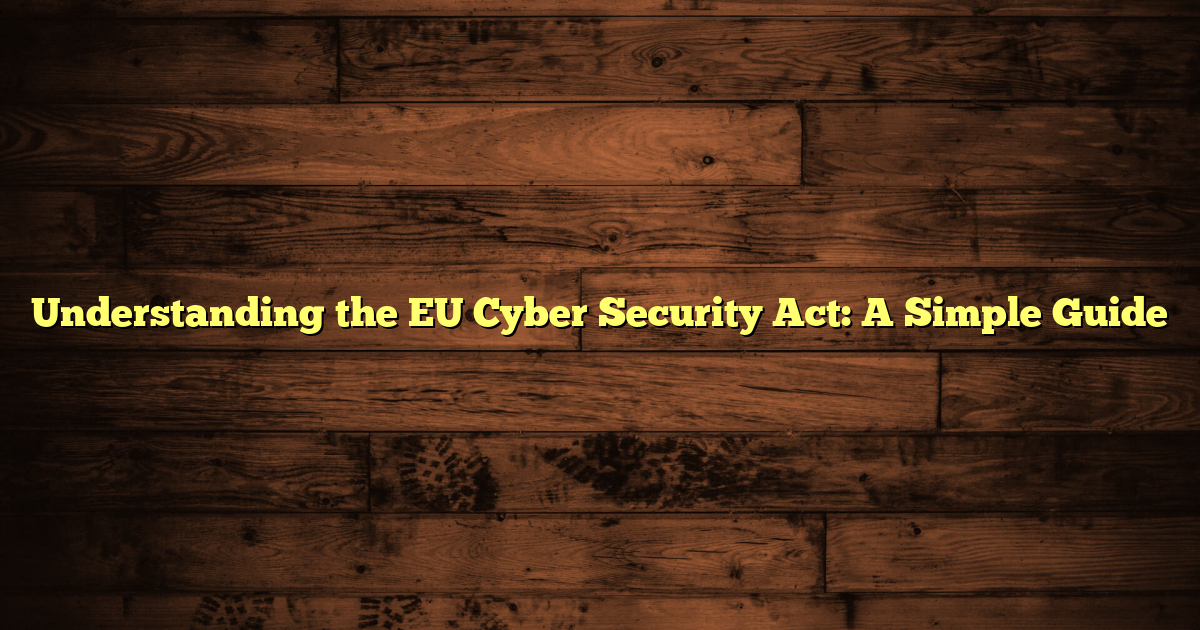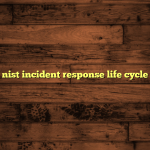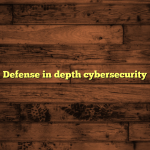Understanding the EU Cyber Security Act: A Simple Guide
Table of Contents:
What Is the EU Cyber Security Act?
Why Was It Needed?
How Does It Work?
What Else Is Happening Around Cybersecurity in the EU?
What Are People Saying About All This?
Reviewing & Updating The Law
Practical Implications For Businesses And Consumers
Summary Table: Key Points About The EU Cyber Security Act
Looking Ahead
FAQ
Understanding the EU Cyber Security Act: A Simple Guide
Is your data safe in the digital age? The EU Cyber Security Act is designed to provide a safer online experience for everyone. Let’s explore what this Act is all about, its importance, as well as its current status in simple terms.
What Is the EU Cyber Security Act?
The EU Cyber Security Act (CSA), formally Regulation (EU) 2019/881, plays a significant role in Europe’s digital defenses. Adopted in 2019, its purpose was to grant the European Union Agency for Cybersecurity (ENISA) a lasting role and establish a system for validating information and communication technology (ICT) products, services, next to processes. In straightforward language, it strives to guarantee digital elements used in Europe meet specific protection criteria.
Before the CSA, ENISA operated with temporary authorizations that required frequent renewals. This Act ensured ENISA a stable position, enabling them to prioritize long-term protection plans, rather than worrying about funding problems.
Why Was It Needed?
The rise in cyber threats, with more frequent attacks and more intricate hacking methods, necessitated a stronger EU response. As a result, the CSA forms part of a wider drive to safeguard everything from governmental systems to your favored online stores. It also created the European Cybersecurity Certification Framework (ECCF), a procedure for entities to have their products or services accredited as protected by adhering to set standards.
A noteworthy detail is that, until now, ECCF accreditation has remained largely optional. This means entities have the freedom to seek accreditation for their offerings. Some voices, however, advocate for making it required, especially in industries considered fundamental, like finance or healthcare.
How Does It Work?
The CSA entrusts ENISA with dual responsibilities:
- Supporting Member States – ENISA helps countries in coordinating their strategies on protection matters.
- Certification Framework – ENISA develops standards for validating the protection level of ICT goods and services.
For example, there has been discussions regarding accreditation for cloud services through the European Union Cloud Services Scheme (EUCS). This topic has stirred controversies. Some nations are seeking additional rules governing data residency or the control of cloud service providers. Essentially, the intention is to keep data within Europe, opposed to permitting external entities access to private details.
What Else Is Happening Around Cybersecurity in the EU?
Since 2019, there have been rapid changes. Newly adopted laws like the NIS2 (Network or Information Security Directive), the CRA (Cyber Resilience Act), together with DORA (Digital Operational Resilience Act), coexist alongside the CSA. These statutes impose additional duties on those selling connected products or offering necessary digital services.
For instance:
- CRA – It requires manufacturers to provide continuous safety enhancements for web-enabled gadgets.
- Mandatory Reporting – Should an exploited weakness be detected in a product sold within Europe, you need to notify authorities in 24 hours.
- Who’s Responsible? Mainly manufacturers, even if based outside Europe, though distributors also carry some responsibility when offering insecure goods inside Europe.
- New Networks & Emergency Plans – A pan-EU “cyber hub” concept is underway, promoting swift threat intelligence distribution among nations. Moreover, an emergency structure is intended to accelerate responses when considerable cyber events occur, going as far as an “EU Cybersecurity Reserve” comprised of credible service vendors willing to assist in crises.
All of these new regulations mean that ENISA now has increased functions in addition to overseeing accreditation programs and providing advice.
What Are People Saying About All This?
Opinions are varied:
- Positive Aspects – There’s agreement that better cross-border safety coordination is necessary, given that hackers disregard national borders.
- Challenges Ahead – Some indicate that accreditation programs lack widespread adoption given the absence of mandatory rules in various locations. Other concerns relate to potential overlapping roles between agencies or the introduction of new laws that bring complication, not simplification.
- Supply Chain Risks – Concern is growing around whether frameworks sufficiently deal with supply chain hazards involving suppliers who are not under direct control. For example, components arriving from external vendors possibly not adhering to rigorous safety methods.
Furthermore, importers and distributors should remain vigilant, despite many duties currently falling on manufacturers under the CRA.
Reviewing & Updating The Law
Tech advances quickly, but regulations are slower. Regulators realized soon after CSA was created that there was already a need for updates given an evolving threat environment coupled with recently introduced regulations.
A recent public input process lasted until June 20th of this year. It asked stakeholders to submit input pertaining to two central items:
- Must we better define or expand the agency mandate?
- How effective is the current certification system in practical cases, considering current commitments established by the CRA?
The review’s goal is to make the comprehensive digital rule structure in the EU easier and more consistent. It is also important to guarantee that ENISA efficiently helps member nations deal with growing, intricate problems.
Practical Implications For Businesses And Consumers
If your business is selling any product connected to the internet in the European market, there is a high chance you need to comply with different parts of these regulations. It will depend on what sector is involved!
Manufacturers
- They must guarantee continuous software updates throughout the device lifecycle.
- Vulnerabilities must be reported within a short time frame.
- Technical documentation is needed to prove compliance.
Distributors/Importers
- They cannot ignore responsibility. They must check the products meet requirements before putting them onto the market, or they risk penalties.
Consumers
- Consumers should benefit from more transparency regarding safety features. The aim is to make standard certifications easier to understand for the gadgets and services.
However, things can be messy as multiple overlapping frameworks may confuse the situation. Further harmonization is needed via the planned consultations and reviews taking place.
Summary Table: Key Points About The EU Cyber Security Act
| Aspect | Details |
| Main Purpose | Permanent mandate for ENISA + cybersecurity certification framework |
| Certification | Voluntary ECCF scheme – debates over mandatory adoption |
| Recent Updates | Public consultation open until June 20th 2025 |
| Related Laws | NIS2 Directive / CRA / DORA |
| Who Must Comply | Manufacturers / Distributors / Importers |
| Obligations | Ongoing support & updates / Vulnerability reporting |
Looking Ahead
Given that public consultation is underway, the EU will likely propose legislation soon. This will impact anyone who conducts business in the EU, no matter the country they originate from.
The goal remains the same: improving our collective capacity against cyber threats. Expect to see big changes, which is necessary in our current, connected time.
Stay informed folks, as the story isn’t complete yet!
FAQ
What is the purpose of the EU Cyber Security Act?
It gives ENISA a permanent mandate and establishes a framework for certifying ICT products and services, ultimately making digital products used in Europe more secure.
Who needs to comply with the EU Cyber Security Act?
Manufacturers, distributors, along with importers of connected devices and digital services within the EU.
Is certification under the ECCF mandatory?
Currently, it is voluntary, but there are ongoing discussions about making it mandatory for critical sectors like banking and healthcare.
What are some of the related laws alongside the EU Cyber Security Act?
The NIS2 Directive, Cyber Resilience Act (CRA), as well as Digital Operational Resilience Act (DORA).
When is the next public consultation for the EU Cyber Security Act?
A public consultation was open until June 20th 2025.
Resources & References:
- https://datamatters.sidley.com/2024/12/23/looking-ahead-to-2025-in-eu-cybersecurity-developments/
- https://www.fieldfisher.com/en/locations/germany/insights/eu-cyber-security-strategy-new-laws-new-obligatio
- https://www.regulationtomorrow.com/france/fintech-fr/european-commission-consults-on-review-of-cybersecurity-act/
- https://publyon.com/eu-cybersecurity-act-strategy-scope-and-stakes/
- https://streamlex.eu/news/the-eu-cybersecurity-act-under-review-what-comes-next/





